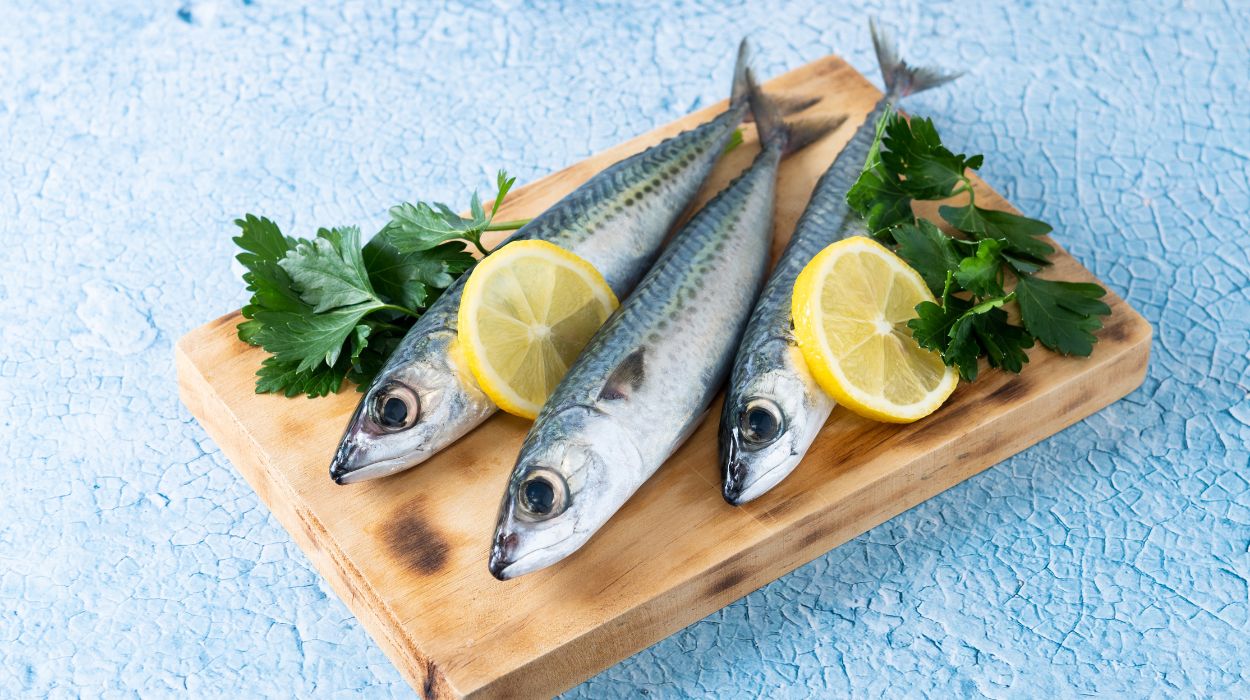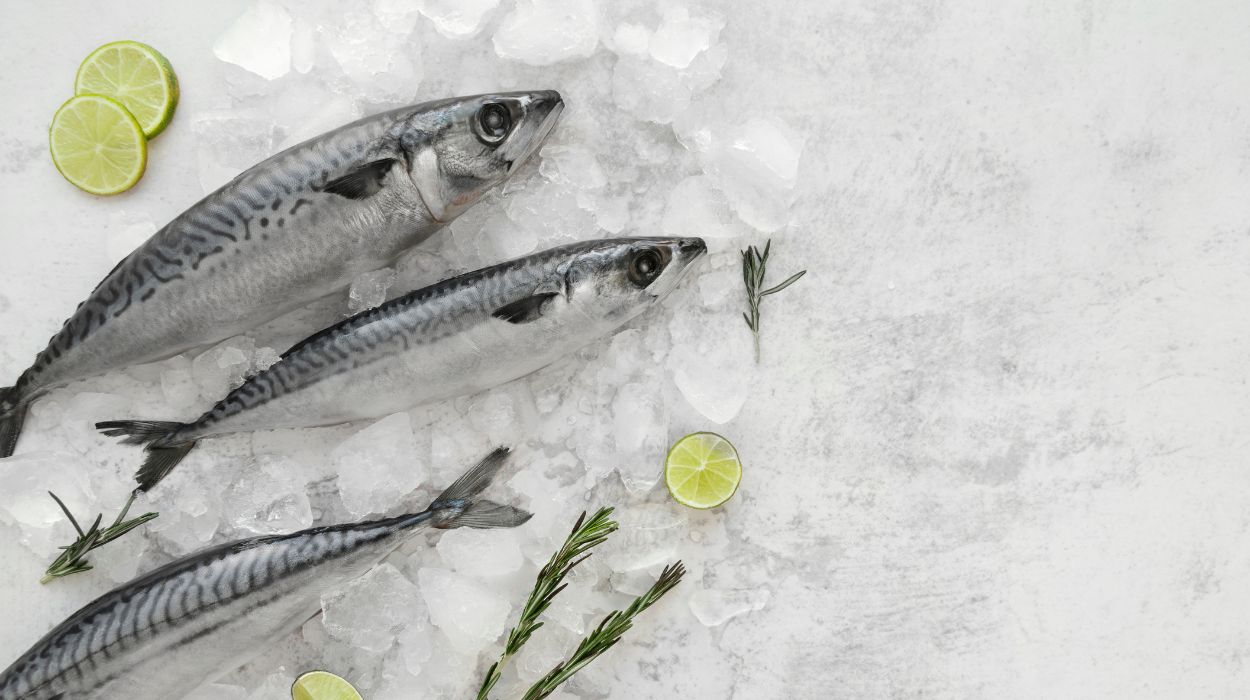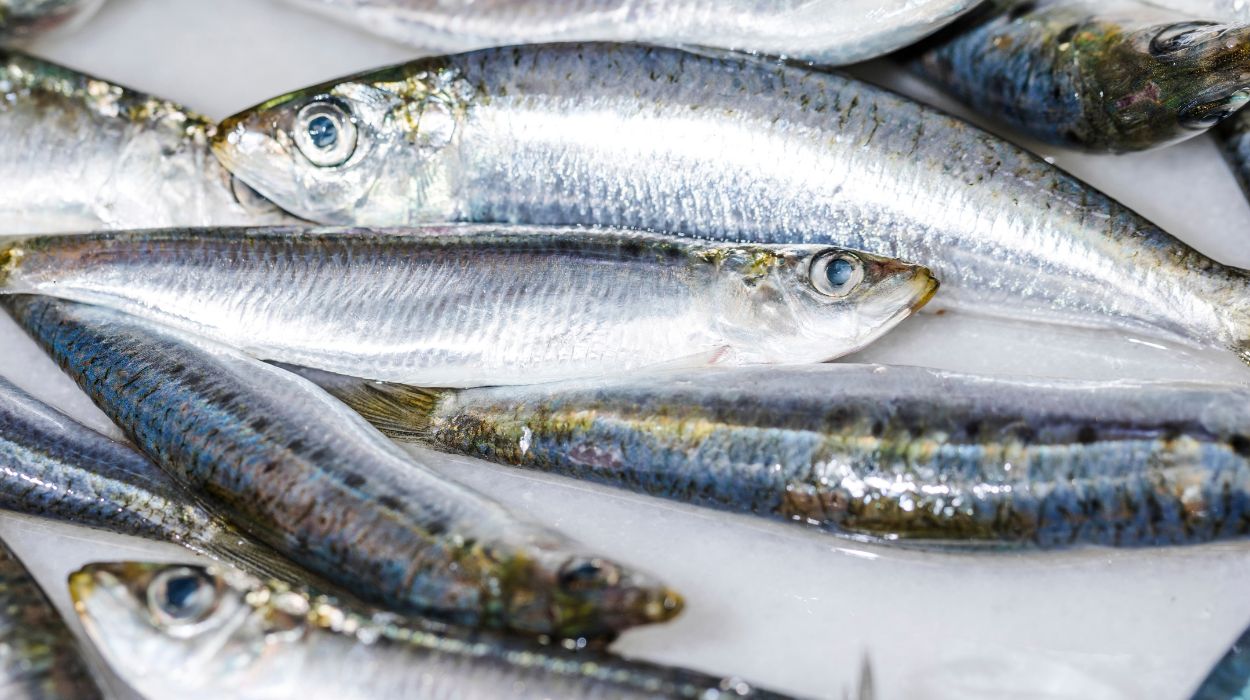 Expert's opinion
Expert's opinion
Expert's opinion
The article is a subjective view on this topic written by writers specializing in medical writing.
It may reflect on a personal journey surrounding struggles with an illness or medical condition, involve product comparisons, diet considerations, or other health-related opinions.
Although the view is entirely that of the writer, it is based on academic experiences and scientific research they have conducted; it is fact-checked by a team of degreed medical experts, and validated by sources attached to the article.
The numbers in parenthesis (1,2,3) will take you to clickable links to related scientific papers.
Are Sardines Good For You? Let’s Explore Sardines Benefits In 2024

Sardines are small, fatty fish that are low in calories while having a great nutrient profile. A 100-gram serving of sardines contains under 200 calories and provides an impressive array of macro and micronutrients, including protein, essential fatty acids, and various vitamins and minerals.
Sardines are also a rich source of omega-3, vitamin B, iron, and vitamin D. As a bonus, they are a naturally rich source of dairy-free calcium, which helps promote strong bones and teeth.
They can be a little intimidating to work with if you are new to buying and incorporating them into your meals, so today, we will break down the health benefits of these little fish and give you some easy ways to eat them.
Are Sardines Good For You?
Sardines are considered healthy due to their high nutritional value. They are an excellent source of protein, omega-3 fatty acids, calcium, iron, and vitamin D.
They are also low in mercury, making them a safe choice for people concerned about consuming harmful toxins.
Sardines are also an environmentally friendly choice. They are small, fast-growing fish typically caught using sustainable fishing practices.
Health Benefits Of Sardines

Sardines are a nutrient-rich seafood that provides numerous potential health benefits. They contain high levels of omega-3 fatty acids, which have been linked to[1] improved heart health, mental well-being, reduction of type 2 diabetes, and reduction of inflammation.
Increases Dietary Protein
Protein is vital for human health and the growth and maintenance of the body, with one serving of sardines providing a considerable amount of the recommended daily intake for the average person,[2] usually 0.8 grams per kilogram of body weight. This makes them a great source of protein for those looking to get more into their diet without adding excess calories.
Decreased Chance Of Heart Disease
The essential omega-3s and other healthy fats help protect against heart disease[3] by decreasing inflammation and helping to reduce triglyceride levels in the blood. One hundred grams of sardines provide at least 50% of the recommended daily intake for omega-3s[4] for adults, though different brands may provide more or less.
Reduces Inflammation
The high omega-3 content in sardines can help reduce pain and symptoms associated with rheumatoid arthritis[5] and other inflammatory processes. Omega-3s have been shown to reduce inflammation by modulating inflammatory proteins and molecules.[6] Reducing inflammation on a systemic level can aid with the symptoms of various conditions such as joint pain, bone health, stiffness, and swelling.
Healthy Fetal Development
Omega-3s can aid in fetal development during pregnancy by supporting the healthy development of the fetal brain and eyes. Studies have suggested that pregnant women who consumed more omega-3s[7] had children with better cognitive skills.
Good For Brain Health And Nervous System Function
One of the many other sardine benefits is that they are a great source of B vitamins, including vitamin B12, which is essential for red blood cell production and neurological functioning. According to research, higher intakes of vitamin B12 may decrease the risk of stroke,[8] although more studies need to be done to determine its exact effects.
The omega-3 content in sardines can help to improve cognitive function, especially memory retention, and recall. Studies have also shown that omega-3s can help to protect the brain from age-related cognitive decline.[9]
Reduce The Risk Of Osteoporosis
Sardines and other small bony fish[10] are excellent sources of calcium, which is essential for healthy bones. They also provide vitamin D, magnesium, and phosphorus, all of which help the body absorb calcium more effectively. This is particularly useful for those who cannot consume calcium from dairy sources. Eating them regularly can help reduce the risk of osteoporosis and other bone-related diseases.
Reduce Oxidative Stress And Improve Thyroid Function
Sardines are high in selenium, which is vital for proper thyroid functioning. Selenium also helps to protect cells from damage, reduces inflammation, and boosts immunity. Studies have shown that diets rich in selenium may reduce oxidative stress,[11] which causes health problems.
Increases Magnesium Levels
Magnesium has been shown to play a critical role in over 300 chemical reactions in the body.[12] It helps to regulate blood pressure levels and maintains normal nerve and muscle function. It can also help to prevent heart disease by reducing the risk of stroke and coronary artery disease. Magnesium has been linked to improved sleep quality, better glucose control, increased bone mineral density, and a lower risk of type 2 diabetes. It may reduce the risk of developing certain types of cancer and aid in the prevention of migraine headaches.
Increase Iron Levels
Sardines are high in iron, which is part of the hemoglobin molecule that transports oxygen throughout the body,[13] increases energy production, and aids in brain development, cell growth, and immune system function.
Nutrition Values For Sardines
According to the United States Department of Agriculture,[14] a 100-gram serving of sardines contains a significant portion of the recommended daily intake of calcium, selenium, dietary vitamin D, and various B vitamins.
- Calories: 208.
- Protein: 24.6 grams.
- Fat: 11.4 grams.
- Carbohydrates: 0 grams.
- Calcium: 382 milligrams.
- Magnesium: 39 milligrams.
- Phosphorus: 490 milligrams.
- Potassium: 397 milligrams.
- Selenium: 52.7 micrograms.
- Niacin: 5.24 milligrams.
- Vitamin B12: 8.94 micrograms.
- Omega-3 fatty acids: 2.2 grams.
How To Choose Sardines
There are a few handy tips and tricks to remember when choosing fresh ones:
- Look for those that appear bright and shiny, with plump flesh.
- The skin should appear intact, and the scales should not fall off.
- A fresh smell is key when selecting sardines; they should smell like the sea, not fishy.
- The eyes should be bright and clear, not cloudy or sunken in.
- Avoid sardines with a strong fishy smell or that appear overly soft or mushy.
It’s also important to consider where the sardines were caught and find sustainable brands sourced from clean waters.
Are packaged sardines from the supermarket healthy? They can be. They contain the vitamins and minerals mentioned above and can improve heart health, cholesterol levels, joint flexibility, etc. Read the label on canned sardines to ensure they do not contain added preservatives or too much salt. It is best to select those that are in olive oil or water. Eating sardines and other fish from the supermarket can be healthy with all these considerations in mind.
Ways To Add Sardines To Your Meals

- Add to salads: Simply place a few slices of sardine on top of your favorite leafy greens, vegetables, and olive oil-based dressings.
- Mix with rice and vegetables: Combine sardines or other oily fish like salmon with rice and veggies for a delicious dinner.
- Hummus with sardines: Eating canned sardines mix hummus is an easy snack or appetizer idea.
- Sardine pizza: Add sardines to your favorite pizza as an additional salty topping.
- Grilled sardine skewers: Grill some sardines on wooden skewers, along with vegetables like bell peppers, onion, and cherry tomatoes, for a simple, tasty meal.
- Baked sardines with herbs: Bake sardines in the oven with fresh herbs like rosemary, thyme, and oregano for an easy dinner.
- Pasta puttanesca: Make a classic puttanesca sauce using sardines as one of your main ingredients.
- Mediterranean salad bowls: Layer up a salad bowl with lettuce, tomatoes, cucumbers, olives, feta cheese, and canned sardines for a quick lunch or dinner.
- Avocado and sardine toast: Spread mashed avocado on toast, then top it off with sardines and fresh dill or parsley.
Health Precautions
Are there any cases where sardines are bad for you? There are a couple of possible health precautions to consider when it comes to eating them. Canned sardines tend to be pretty high in sodium, and if ordering sardines at a restaurant, it is important to check how much salt is added to them and ask for a low-sodium option. Too much salt can lead to high blood pressure and other cardiovascular problems, and if your healthcare practitioner has you on a low-sodium diet, some forms of sardine may not be the best option for you.
The mercury content of sardines[15] is another potential issue. While small fish like sardines generally have a lower mercury content than larger, predatory fish, they still contain some mercury. Overeating fish high in mercury can lead to health problems, especially in young children or pregnant women. Be sure to check with a healthcare provider before indulging in them regularly.
Sardines also contain compounds called purines, which can increase uric acid levels in the blood.[16] High uric acid levels can be linked to gout and kidney stones, so if you are prone to these conditions or have a family history of them, you should talk to your doctor before eating them regularly.
Conclusion
So, “Are sardines healthy?” Sardines can be an absolute powerhouse regarding nutritional benefits and are well worth incorporating into your diet where you can. Whether grilled, baked, or added to salads and pasta dishes, they are a versatile and delicious way to boost your health and enjoy the many advantages they provide. Just be mindful of their sodium content if you are using canned ones.
+ 16 sources
Health Canal avoids using tertiary references. We have strict sourcing guidelines and rely on peer-reviewed studies, academic researches from medical associations and institutions. To ensure the accuracy of articles in Health Canal, you can read more about the editorial process here
- Food Reviews International. (2022). Prevention of Type 2 Diabetes through Sardines Consumption: An Integrative Review. [online] Available at: https://www.tandfonline.com/doi/full/10.1080/87559129.2020.1867565.
- Lonnie, M., Hooker, E., Brunstrom, J., Corfe, B., Green, M., Watson, A., Williams, E., Stevenson, E., Penson, S. and Johnstone, A. (2018). Protein for Life: Review of Optimal Protein Intake, Sustainable Dietary Sources and the Effect on Appetite in Ageing Adults. Nutrients, [online] 10(3), p.360. doi:https://doi.org/10.3390/nu10030360.
- Jacob, J., Peter, S. and Chopra, S. (2013). A fish a day, keeps the cardiologist away! – A review of the effect of omega-3 fatty acids in the cardiovascular system. Indian Journal of Endocrinology and Metabolism, [online] 17(3), p.422. doi:https://doi.org/10.4103/2230-8210.111630.
- Nih.gov. (2015). Office of Dietary Supplements – Omega-3 Fatty Acids. [online] Available at: https://ods.od.nih.gov/factsheets/Omega3FattyAcids-HealthProfessional/.
- Rajaei, E., Mowla, K., Ghorbani, A., Bahadoram, S., Bahadoram, M. and Dargahi-Malamir, M. (2015). The Effect of Omega-3 Fatty Acids in Patients With Active Rheumatoid Arthritis Receiving DMARDs Therapy: Double-Blind Randomized Controlled Trial. Global Journal of Health Science, [online] 8(7), p.18. doi:https://doi.org/10.5539/gjhs.v8n7p18.
- Giacobbe, J., Benoiton, B., Zunszain, P., Pariante, C.M. and Borsini, A. (2020). The Anti-Inflammatory Role of Omega-3 Polyunsaturated Fatty Acids Metabolites in Pre-Clinical Models of Psychiatric, Neurodegenerative, and Neurological Disorders. Frontiers in Psychiatry, [online] 11. doi:https://doi.org/10.3389/fpsyt.2020.00122.
- Nevins, J.E.H., Donovan, S.M., Snetselaar, L., Dewey, K.G., Novotny, R., Stang, J., Taveras, E.M., Kleinman, R.E., Bailey, R.L., Raghavan, R., Scinto-Madonich, S.R., Venkatramanan, S., Butera, G., Terry, N., Altman, J., Adler, M., Obbagy, J.E., Stoody, E.E. and de Jesus, J. (2021). Omega-3 Fatty Acid Dietary Supplements Consumed During Pregnancy and Lactation and Child Neurodevelopment: A Systematic Review. The Journal of Nutrition, [online] 151(11), pp.3483–3494. doi:https://doi.org/10.1093/jn/nxab238.
- Jadavji, N., Yahn, G. and Abato, J. (2021). Role of vitamin B12 deficiency in ischemic stroke risk and outcome. Neural Regeneration Research, [online] 16(3), p.470. doi:https://doi.org/10.4103/1673-5374.291381.
- Mora, I., Arola, L., Caimari, A., Escoté, X. and Puiggròs, F. (2022). Structured Long-Chain Omega-3 Fatty Acids for Improvement of Cognitive Function during Aging. International Journal of Molecular Sciences, [online] 23(7), p.3472. doi:https://doi.org/10.3390/ijms23073472.
- Muñoz-Garach, A., García-Fontana, B. and Muñoz-Torres, M. (2020). Nutrients and Dietary Patterns Related to Osteoporosis. Nutrients, [online] 12(7), p.1986. doi:https://doi.org/10.3390/nu12071986.
- Kieliszek, M., Bano, I. and Zare, H. (2021). A Comprehensive Review on Selenium and Its Effects on Human Health and Distribution in Middle Eastern Countries. Biological Trace Element Research, [online] 200(3), pp.971–987. doi:https://doi.org/10.1007/s12011-021-02716-z.
- Al Alawi, A.M., Majoni, S.W. and Falhammar, H. (2018). Magnesium and Human Health: Perspectives and Research Directions. International Journal of Endocrinology, [online] 2018, pp.1–17. doi:https://doi.org/10.1155/2018/9041694.
- Abbaspour, N., Hurrell, R. and Kelishadi, R. (2014). Review on iron and its importance for human health. Journal of research in medical sciences : the official journal of Isfahan University of Medical Sciences, [online] 19(2), pp.164–74. Available at: https://www.ncbi.nlm.nih.gov/pmc/articles/PMC3999603/.
- Usda.gov. (2023). FoodData Central. [online] Available at: https://fdc.nal.usda.gov/fdc-app.html#/?query=sardines.
- Mehouel, F., Bouayad, L., Hammoudi, A.H., Ayadi, O. and Regad, F. (2019). Evaluation of the heavy metals (mercury, lead, and cadmium) contamination of sardine (Sardina pilchardus) and swordfish (Xiphias gladius) fished in three Algerian coasts. Veterinary World, [online] 12(1), pp.7–11. doi:https://doi.org/10.14202/vetworld.2019.7-11.
- Li, T., Ren, L., Wang, D., Song, M., Li, Q. and Li, J. (2019). Optimization of extraction conditions and determination of purine content in marine fish during boiling. PeerJ, [online] 7, p.e6690. doi:https://doi.org/10.7717/peerj.6690.



